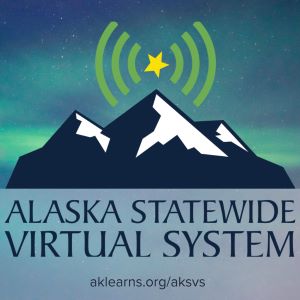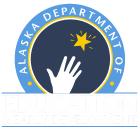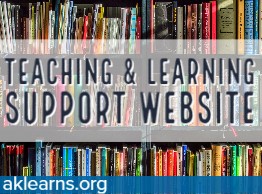- Cama-i, quyana tailuci!
- (Central Yup’ik)
- "Greetings, thank you for coming!"
Novel Coronavirus Disease (COVID-19)
Teaching and Learning Support
In an effort to provide information, resources, and leadership to support educators during this challenging time, the Department of Education and Early Development (DEED) launched a Teaching and Learning Support website. The goal of the website is to provide Alaska’s educators and families with relevant resources as they prepare for possible school closures related to the rapidly evolving COVID-19 situation. The site will continue to evolve and grow over the coming days and weeks.
DEED invites educators to contribute feedback, ideas, and resources through the site's submission form so DEED can share the good work of so many educators and parents statewide as we face this unprecedented challenge together.
Developed by the Alaska Department of Education and Early Development, the Alaska Statewide Virtual System (AKSVS) aims to expand opportunities for K-12 students across Alaska through high-quality, online coursework.
AKSVS is shifting to summer learning support for students in Grades 6-12. Summer learning opportunities are traditional, full-semester content courses for middle and high school learners. Courses are available at no cost for students currently enrolled in any one of Alaska's 54 school districts.

For the latest information on COVID-19 relating to schools, please follow DEED on social media at @AlaskaDEED
DEED developed this site to share the rapidly evolving COVID-19 situation. Please check for frequent updates, as staff is reviewing and editing the site daily as we respond to this emerging outbreak.
Alaska Smart Start 2020
The Department of Education and Early Development (DEED), in partnership with the Department of Health and Social Services (DHSS), developed guidance to support planning and strategies for reopening schools. ‘Alaska Smart Start 2020’ framework for K-12 schools provides a tiered approach based on COVID-19 pandemic risk levels per community. School districts and communities will work together to develop clear, actionable steps that are necessary for teaching and learning to continue throughout the 2020-2021 school year. These health parameters provide a basis for plans that are specific, actionable, and broad enough to be adaptable.
Alaska Smart Start 2020 is built upon the guidance and recommendations of health officials and collaborative conversations with education stakeholders; it is aligned to the reopening guidelines that have been provided by our state and federal leaders; and it is designed to help districts prioritize the health and safety of students and teachers as they deliver instruction for the 2020-2021 school year.
To continue the creative discourse and scenario planning achieved through the Alaska Smart Start 2020 webinar series held this spring, DEED, with the support of the Region 16 Comprehensive Center, is launching the Alaska Smart Start Summer Virtual Summit 2020 to be held throughout the month of August. The Virtual Summit invites teachers, parents, district staff, tribal leaders, community members, and education stakeholders to interact daily with expert guest speakers, network with a statewide community of learners, and collectively plan for the conditions, continuity, and capacities for learning in the upcoming school year.
To learn more about the Alaska Smart Start Summer Virtual Summit 2020 and to register visit aklearns.org/smartwebinar/.
- Revised! Alaska Smart Start 2020 Framework Guidance
- NEW! Alaska Smart Start Summer Virtual Summit 2020
- From Uncertainty to Certainty – Alaska Smart Start 2020 Webinar Series Archive
- CDC’s School Reopening Decision Tool
- CDC’s Interim Guidance for Schools and Day Camps
- State by State School Reentry Guidance and Resources
- 2020 Primary Election Planning in Response to COVID-19
State-Issued Health Mandates
To prevent or slow the spread of Coronavirus Disease 2019 (COVID-19), the State of Alaska issued its first health mandate on March 13, 2020. The mandate dictates that all scheduled public school days starting March 16, 2020 through March 27, 2020 will be non-student contact days in which students will not be attending school.
On March 16, 2020, Governor Dunleavy directed all residential boarding school programs to begin the process of returning students to their home communities. The process of returning students home should be completed by March 27, 2020.
On April 9 Governor Dunleavy issued a health mandate EXTENDING THE CLOSURE OF ALL K-12 PUBLIC SCHOOLS THROUGH THE END OF THE 2019-2020 SCHOOL YEAR. Student learning will continue, per each school district's individual plan, to provide distance-delivered educational services to students.
Governor Dunleavy issued COVID-19 Disaster Order of Suspension No. 3, which suspends AS 14.17.505 and 4 AAC 09.160 relating to fund balance in school operating budgets. The suspension of these statutes and regulations allow school districts to retain more than 10% of their operating funds for the following year in response to COVID-19 and the closure of school buildings for the remainder of the 2019-2020 school year.
Per Health Mandate 008 issued on March 20, a universal preapproval relating to school closures is being provided and the Governor is suspending the regulatory requirement that school districts apply to DEED to receive a school calendar waiver. The suspension of these requirements are contingent upon providing distance-delivered educational services through the duration of school closures.
Governor Dunleavy’s COVID-19 Health Mandate – April 9, 2020
Governor Dunleavy’s COVID-19 Health Mandate – March 20, 2020
DEED’s COVID-19 Memo Extending School Closure – March 20, 2020
Governor Dunleavy's COVID-19 Health Mandate - March 16, 2020
DEED COVID-19 Memo to Alaska Residential School Programs - March 16, 2020
Governor Dunleavy’s COVID-19 Health Mandate - March 13, 2020
DEED COVID-19 Memo to Alaska Public Schools - March 13, 2020
Background Information
Novel coronavirus (COVID-19) is a new virus that was first detected in China in December 2019. Health experts are concerned because it spreads from person to person and has the potential to cause severe illness. While in some cases illness can be severe and require hospitalization, many individuals infected with novel coronavirus recover by resting, drinking plenty of liquids, and taking pain and fever-reducing medications.
What is the difference between seasonal and novel coronavirus?
Coronaviruses are a family of viruses and there are different types of coronavirus within that family, much like there are different types of influenza viruses. Coronaviruses in general are not new, they are quite common and are a frequent cause of respiratory illnesses such as the common cold. Coronaviruses tend to circulate in the fall and winter months, similar to influenza. Most people get infected with these viruses at some point in their lives.
The type of coronavirus that has recently emerged in Wuhan, China is a new type of coronavirus and is infecting people for the first time (which means that people do not have any immunity to it).
What are common symptoms of COVID-19?
Information to date suggests this virus is causing symptoms consistent with a respiratory illness such as cough, fever, and shortness of breath. It should not be assumed that respiratory illnesses are novel coronavirus; however, if you have symptoms consistent with COVID-19 please call a medical provider in advance of seeking medical care. Calling ahead will help the medical provider’s office take steps to keep other people from being exposed. You may also use the Coronavirus Checker website to assess your symptoms and risk.
COVID Relief Information
ARP Act Information
The American Rescue Plan Act, 2021 (ARP), was signed into law on March 11, 2021. The ARP Act provides an additional $122 billion for the Elementary and Secondary School Emergency Relief Fund (ESSER III Fund) to help meet a wide range of needs arising from the Coronavirus pandemic, including reopening schools safely, sustaining their safe operation, and addressing students’ social, emotional, mental health, and academic needs resulting from the pandemic. The ARP Act provides an additional $2.75 billion in assistance to Non-Public Schools (EANS), $3 billion for Special Education, and additional funding for homeless children & youth, Tribal Educational Agencies, Native Hawaiians, and Alaska Natives.
Important ARP Act Documents & Links
ARP Act State Activities Suggestion Form
5.24.21 COVID Relief Funding Guidelines: A Resource for Spending Funds Effectively
5.24.21 ARP ESSER III district allocations
9.1.2021 All COVID relief funding district allocations to date
CDC’s Prevention Strategies to Reduce Transmission of COVID-19
US ED Roadmap to Reopening Schools Volume 1
US ED Roadmap to Reopening Schools Volume 2
Memo from Commissioner, Guidance on Federal COVID-19 Relief Funding
US ED American Rescue Plan Site
American Rescue Plan Act of 2021 Legislation
US ED Education Stabilization Fund
US ED Elementary and Secondary School Emergency Relief Fund Webpage
CRRSA Act Information
The Coronavirus Response and Relief Supplemental Appropriations Act, 2021 (CRRSA), was signed into law on December 27, 2020. The CRRSA Act provides an additional $54.3 billion for the Elementary and Secondary School Emergency Relief Fund (ESSER II Fund) to support fully reopening K-12 schools, facilitate continuity of learning, and measure and address the learning loss caused by a lack of in-person learning opportunities. The CRRSA Act provides an additional $4 billion for the Governor’s Emergency Education Relief Fund (GEER II Fund).
Important CRRSA Act Documents & Links
CITC Culturally Relevant Schools Grant Proposal
02.22.21 CRRSA Act Informational Document
02.22.21 Federal COVID Relief Funding – Terminology & Definitions
02.12.21 Emergency Assistance to Non-Public Schools (EANS) Application
02.12.21 EANS Letter from DEED Commissioner Johnson
01.29.21 ESSER II Fund Guidance
01.20.21 COVID-19 Relief Funding for Alaska School Districts
01.15.21 ESSER II District Allocations
US ED Elementary and Secondary School Emergency Relief Fund Webpage
CARES Act Information
The Coronavirus Aid, Relief and Economic Security (CARES) Act, signed into law on March 27, 2020, provides funding and flexibilities for States to respond to the COVID-19 emergency in K-12 schools. In addition to providing a variety of waivers for assessments, accountability, reporting and funding carryover, the CARES Act provides an economic stimulus to individuals, businesses, and schools.
Important CARES Act Documents & Links
GEERF Competitive Grant Intent to Award List
GEERF Competitive Grant Score Sheet (alphabetical)
GEERF Competitive Grant Score Sheet (by score)
Governor's Emergency Education Relief Fund Competitive Grant Request for Proposals
Governor’s Emergency Education Relief Fund RFA
FY21 Coronavirus, Relief, and Economic Security Act Assurances and Certification Packet (GEERF)
CARES Act Relief Funding Information Webinar PPT
4.23.2020 U.S. ED Elementary and Secondary School Emergency Relief Fund Allocations by State (pdf)
4.22.2020 Guidance on CARES Act Funds to Districts (pdf)
4.21.2020 Estimated CARES Act Funding to Districts (pdf)
4.27.2020 CARES Act Funding to Districts.
For Health Information and Support Relating to COVID-19 in Alaska
Alaska Department of Health and Social Services (DHSS)
The Alaska Section of Epidemiology is closely monitoring the rapidly-emerging outbreak of COVID-19. On March 12 the first case was detected in Alaska.
DHSS is working with the Center for Disease Control and Prevention (CDC) and other state and local public health partners to respond to this emerging public health threat. Please refer to the website below for current information.
Please call 269-8000 for medically-related questions
Call or email 2-1-1 with any non-clinical questions
The Department of Health and Social Services also made a webpage specific for parents and caregivers as they navigate the new school year. Whether children are homeschooling, remote learning, or in a classroom with other students, there are many ways to help keep kids safe from COVID-19 while learning.
Other Health and Safety Resources:
- Alaska Careline Suicide & Crisis: Call 877-266-4357 (HELP)
- National Suicide Hotline: Call 1-800-273-TALK (8255) or text 741741
- Self-Injury/Cutting: Call 1-800-366-8288 | selfinjury.com
- Runaway Hotline: 1-800-786-2929 | Chat 1800runaway.org
- Child Abuse Hotline: Call or Text 1-800-478-4444 | Chat ReportChildAbuse@alaska.gov
- Helpful Tips for Protecting Children and Reporting Abuse During the COVID-19 crisis
- Domestic/Relationship Violence Hotline: Call 1-800-799-7233 6 | Text LOVEIS to 22522 | Chat thehotline.org
Be Prepared
The following steps can be taken to prepare for the prevention and response to an outbreak:
- Review important links for updated guidance.
- Practice good hygiene. Wash hands frequently, ideally with soap and warm water for 20 seconds. If soap and water is not available, use alcohol-based hand sanitizer. Avoid touching your eyes, nose, and mouth with unwashed hands. Avoid close contact with people who are sick. Stay home when you are sick. Cover your cough or sneeze with a tissue. Clean and disinfect frequently touched objects or surfaces.
- Train nurses and staff members to watch for signs and symptoms of illness, which are similar to those of lower respiratory illness. Students or staff members who exhibit these signs should be sent home immediately.
- Create an absentee and sick leave policy for students and staff requiring the ill to stay home. Distribute policy to parents.
- Prepare for possible vaccine distribution within schools. Once the vaccine is available, vaccinations will be voluntary, but may be targeted at school-aged children.
- Update district crisis response plans. Districts are required by law to have current crisis response plans in place. Visit the School Safety and Emergency Management webpage for more information.
COVID-19 serves as an important reminder of the importance of including pandemics/disease outbreaks in district crisis response plans. Districts are encouraged to check that their crisis response plans include planning for these types of events, and that these plans are updated. District plans should include the following basic components:
- Improve the sanitation of your schools and the personal sanitation of staff and students.
- Communicate with parents about their responsibilities to monitor their children’s health.
- Communicate with parents about school actions regarding the flu.
- Encourage staff and students to consider obtaining annual flu vaccinations
- Watch for flu symptoms among staff and students, and send ill people home.
Preparing for and Responding to Emergency School Closures
Given the recurrent nature of pandemics/disease outbreaks, districts also should prepare a plan for when they would close schools and how to educate students when schools are closed. If a school is closed, DEED will expect the district to submit an education plan.
In the event of emergency school closures, districts are required to notify the department in writing within 24 hours and submit a modified school calendar as soon as possible. Districts are provided several options for substituting closure days; however, the commissioner will decide whether to approve all, some, or none of the days requested. For more information regarding the regulations surrounding emergency school closures, please review the links below.
- Sec. 14.03.030. School term.
- Sec. 14.03.040. Day in session.
- 4 AAC 05.090. Discontinuation or closure of schools
- 4 AAC 05.900. Definitions
Considerations for School Meal Programs
The USDA approved a request from Alaska to allow meal service during school closures to minimize potential exposure to COVID-19. Alaska Child Nutrition Programs has been authorized to provide waivers for SFSP/SSO sponsors for non-congregate feeding due to program closures as a result of COVID-19. Please see the links below for more information and guidance.
Guidance from USDA:
- Child Nutrition Program Meal Service during COVID-19 Outbreaks Q&A
- Summer Food Service Program (SFSP) and Seamless Summer Option (SSO) Meal Delivery Using Existing Authority Q&A
- USDA Announces Feeding Program Partnership in Response to COVID-19
- USDA National Waivers for Flexibility in Child Nutrition Programs
- Q&A related to Child Nutrition Program Monitoring and Reporting Nationwide Waivers
- Fresh Fruit and Vegetable Program during COVID-19
Guidance and Waiver Requests from DEED Child Nutrition Programs:
- DEED Child Nutrition Program Waiver Forms
- DEED Agreement to Waive Regulatory Requirement of Congregate Feeding due to School Closure
- DEED Agreement to Waive Regulatory Requirements for Meal Patterns
- DEED Agreement to Allow Parent/Guardian Pick-up of Non-Congregate Meals
- DEED Agreement to Waive CACFP On-Site Monitoring
- DEED Non-Congregate Meal Program Services SFSP/SSO Waiver Q&A
- Feeding Children During an Unanticipated School Closure PPT
- COVID-19 School Food Service Safety Precautions
- State requested USDA Waivers
Considerations for Assessments and Accountability
In an effort to support school districts in response to Novel Coronavirus Disease 2019 (COVID-19), DEED submitted a request to the U.S. Department of Education (US ED) to waive certain requirements of the Elementary and Secondary Education Act (ESEA, section 1111) related to assessment and accountability requirements. US ED notified DEED on March 23 that the waiver will be approved. As a result, spring 2020 administrations of the following assessments have been cancelled:
- PEAKS content area assessments in Mathematics, English Language Arts, and the Alaska Science Assessment
- Dynamic Learning Maps (DLM) alternate assessment
- WIDA ACCESS for ELLs and Alternate ACCESS
In addition to waiving requirements for assessments, certain requirements for school accountability and reporting will also be waived by US ED.
DEED FAQs for Assessments and Accountability
Social Distancing Guidelines for Testing Facilities
Updates for AP Students and Schools Affected by Coronavirus
For the graduating class of 2020, the testing requirement (ACT, SAT, and WorkKeys) is waived for Alaska Performance Scholarship (APS) eligibility. APS award level will be determined by GPA. The testing requirement is waived due to the cancellation of test administrations in response to the global COVID-19 pandemic. Details of this waiver and any other changes to APS policies are available on the Alaska Commission on Postsecondary Education’s APS website. See page 16 of the COVID-19 Disaster Order of Suspension No.2, Appendix A, Amendment 2.
COVID-19 Disaster Order of Suspension No.2, Appendix A, Amendment 2
Alaska Performance Scholarship Test Score Requirement Update
Considerations for Special Education
DEED has been hosting weekly Special Education (SPED) webinars. For more information please contact Colleen Shivers at (907) 465-8705.
If you have additional questions, or need assistance relating to special education, please contact DEED’s SPED team at (907) 465-2972.
Recordings of past SPED webinars can be viewed below.
March 18, 2020 webinar recording
March 19, 2020 webinar recording
March 20, 2020 webinar recording
March 23, 2020 webinar recording
March 24, 2020 webinar recording
Useful Links:
- DEED SPED COVID-19 Guidance
- DEED SPED FAQs
- DEED Guidance for Special Education Personnel
- DEED’s COVID-19 related SPED FAQs
- DEED’s Special Education Webpage
- U.S. Department of Education OSEP Policy Documents
- U.S. Department of Education FAQ on Providing Services to Children with Disabilities during the COVID-19 Outbreak
- Supplemental Fact Sheet – Addressing the Risk of COVID-19 in Preschool, Elementary, and Secondary Schools While Serving Students with Disabilities
- Q&A on Providing Services to Children with Disabilities During the COVID-19 Outbreak
- Impact of COVID-19 on Assessments and Accountability under the ESEA
Considerations for ESEA Federal Programs
Considerations for ESEA Federal Programs
DEED is committed to working with Alaska school districts and grantees to the maximum operational flexibility necessary to continue operations during the COVID-19 pandemic.
DEED to request waiver to 21st CCLC restrictions; public comment period closes October 7
DEED FAQs for ESEA Federal Programs
FAQs for Title I, Part C Education of Migratory Children
DEED FAQs relating to ESEA Funding Waivers (Updated)
4.29.2020 U.S. ED Fact Sheet for Transferring Local-Level ESEA Funds
4.29.2020 U.S. ED Fact Sheet for Repurposing Federal Equipment and Supplies to Combat COVID-19
McKinney-Veto Homeless Assistance Act FAQ
US ED COVID-19 Fact Sheet for Serving Migratory Children
US ED Fact Sheet for Providing Services to English Learners during the COVID-19 Outbreak
Considerations for CTE Programs
Considerations for Early Learning
Considerations for Attendance and Data Reporting
The purpose of this is to provide guidance to districts on how they should track, document, and report on student days of attendance during the COVID-related school closures. Many districts have switched to delivering instruction through distance delivery methods, this has created many questions on how to track student attendance.
For students that are receiving instruction through distance delivery methods, attendance will be tracked the same way as it is tracked for correspondence schools. Students participating in a correspondence or distance learning program will be counted in attendance for days that the student was in membership. In other words, during the duration of school building closures, students are considered to be in attendance 100% of these days. This temporary change in tracking will apply for days that the student is in membership while school buildings are closed due to the Coronavirus Disease (COVID-19) as outlined in State Health Mandates.
If you have any questions, please do not hesitate to contact Colton Christian (colton.christian@alaska.gov) or John Jones (john.jones2@alaska.gov).
Data Reporting:
Summer OASIS Data Collection FAQ (COVID-19)
Graduation:
With approval from the Alaska Department of Health and Social Services, below is guidance for school districts' consideration regarding conducting graduation ceremonies during the COVID-19 pandemic.
Considerations for Teacher Certification
The Department of Education and Early Development (DEED) is closely monitoring the spread of coronavirus (COVID-19) and the anticipated impact to candidates enrolled in educator preparation programs, Alaska educators, local education agencies (LEAs) or districts, educator preparation providers (EPPs), and educators arriving from out-of-state. The Teacher Certification Office recognizes that we must remain flexible and adaptable as the situation continues to unfold. Our focus is on providing support during this extraordinary time while taking prudent and practical steps to minimize disruption to the certification process. Please use the link below to see additional information about Emergency Certification and the waiving of specific certification requirements. EMERGENCY CERTIFICATION
- DEED COVID-19 Memo re: Temporary Suspension of Certain Teacher Certification and Evaluation Requirements and Issuing of Emergency Certification and Renewal Waivers
- DEED COVID-19 Memo re: Temporary Suspension of Student Teaching Requirements and Issuing of Emergency Certification
- District/Employer Request and Assurance Form
- Educator Requirement Waiver Form
Other Helpful Resources
State of Alasks Resources
- 2019 Novel Coronavirus Flyer (DHSS)
- Influenza Information from the Alaska Department of Health and Social Services (DHSS)
- Alaska Weekly Flu Snapshot Report
- 2017 AK School Emergency Operations Plan Guidebook and Template
- Infectious Disease Management: Guidelines for Alaska Schools (DHSS)
Centers for Disease Control and Prevention (CDC)
The CDC has numerous resources on its website regarding the 2019 Novel Coronavirus (COVID-19). School districts may find the CDC’s Frequently Asked Questions and Answers, specifically the FAQs for K-12 Schools and Childcare Programs, helpful in creating an appropriate and educated epidemiologically based response to concerns regarding COVID-19.
- COVID-19 Cases and Transmission in 17 K–12 Schools in Wisconsin
- Considerations for School Closure
- Community Mitigation Strategy
- COVID-19 Guidance for Schools and Childcare Providers
- Interim Guidance for Administrators of U.S. Childcare Programs and K-12 Schools to Plan, Prepare, and Respond to COVID-19
- Information for Schools & Childcare Providers
- Centers for Disease Control and Prevention (CDC): Influenza (Flu)
- Pandemic Flu Checklist: K-12 School Administrators
- Get Your School Ready for the Pandemic Flu
U.S. Department of Education
- FERPA and Virtual Learning During COVID-19
- FERPA and Virtual Learning Resources
- U.S. Department of Education COVID-19 webpage
- Addressing the risk of COVID-19 in Schools While Protecting Civil Rights
- FAQs Relating to FERPA and COVID-19


